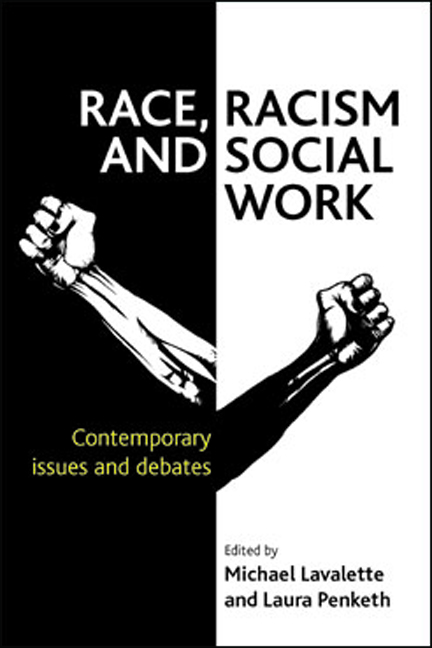Book contents
- Frontmatter
- Contents
- Notes on contributors
- Acknowledgements
- Dedication
- Some terms and definitions
- Introduction: Race, racism and social work
- one Rethinking anti-racist social work in a neoliberal age
- two The growth of xeno-racism and Islamophobia in Britain
- three The catalysers: ‘black’ professionals and the anti-racist movement
- four “Same, same, but different”
- five Antisemitism and anti-racist social work
- six Anti-Roma racism in Europe: past and recent perspectives
- seven In defence of multiculturalism?
- eight Social work and Islamophobia: identity formation among second and third generation Muslim women in north-west England
- nine Institutionalised Islamophobia and the ‘Prevent’ agenda: ‘winning hearts and minds’ or welfare as surveillance and control?
- ten ‘Street-grooming’, sexual abuse and Islamophobia: an anatomy of the Rochdale abuse scandal
- eleven My people?
- twelve Twenty-first century eugenics? A case study about the Merton Test
- thirteen The role of immigration policies in the exploitation of migrant care workers: an ethnographic exploration
- Conclusion: Race, racism and social work today: some concluding thoughts
- Bibliography
- Index
seven - In defence of multiculturalism?
Published online by Cambridge University Press: 01 February 2022
- Frontmatter
- Contents
- Notes on contributors
- Acknowledgements
- Dedication
- Some terms and definitions
- Introduction: Race, racism and social work
- one Rethinking anti-racist social work in a neoliberal age
- two The growth of xeno-racism and Islamophobia in Britain
- three The catalysers: ‘black’ professionals and the anti-racist movement
- four “Same, same, but different”
- five Antisemitism and anti-racist social work
- six Anti-Roma racism in Europe: past and recent perspectives
- seven In defence of multiculturalism?
- eight Social work and Islamophobia: identity formation among second and third generation Muslim women in north-west England
- nine Institutionalised Islamophobia and the ‘Prevent’ agenda: ‘winning hearts and minds’ or welfare as surveillance and control?
- ten ‘Street-grooming’, sexual abuse and Islamophobia: an anatomy of the Rochdale abuse scandal
- eleven My people?
- twelve Twenty-first century eugenics? A case study about the Merton Test
- thirteen The role of immigration policies in the exploitation of migrant care workers: an ethnographic exploration
- Conclusion: Race, racism and social work today: some concluding thoughts
- Bibliography
- Index
Summary
The Professional Capabilities Framework (PCF) domain 8 requires that social workers are aware of changing social contexts. Many social workers writing about anti-racist practice in the 1980s would have followed Sivanandan's (1982) critique of local authority ‘multiculturalism’. Sivanandan's case was that too often policies of multiculturalism were reduced to a celebration of ‘steel-bands, samosas and saris’ while institutional and structural racism was ignored. However, from the perspective of 2013 the attack on multiculturalism has shifted the political terrain. Multiculturalism is being used as a code word by politicians to attack migration and the presence of minority communities in Britain itself – themes that Jenkins addresses in this chapter.
Introduction
The constantly repeated message is that multiculturalism has ‘failed’. According to politicians and pundits, it has allowed ‘tolerance of diversity to harden into the effective isolation of communities, in which some people think separate values ought to apply‘(Phillips 2005); it has not succeeded in instilling belief in ‘freedom of speech, freedom of worship, democracy, the rule of law, equal rights regardless of race, sex or sexuality’ (Cameron 2011c); and the consequences are social fracturing in which Islamist terrorism can grow or, more recently, inner-city rioting can erupt.
The racism, implied or explicit, towards Muslims that anti-multiculturalism has given voice to has now been joined by a new enemy: young working class people (Jones 2011). This should alert us to a larger context: the attack on multiculturalism is not restricted to attacks on a particular ethnic and cultural minority. The venom aimed at a ‘feral underclass’, the new dispossessed on inner-city estates, is inseparable from the project that sees disciplining those on the receiving end of austerity (whatever their cultural background) into acceptance of neoliberalism as the only way in which society can be run. It is not just minorities that are affected (through discrimination or racism, including racist immigration controls). The mass of ordinary working people must be made to accept that there is no alternative and that their anger and resentment must be directed, where possible, at ‘outsiders’ for taking the limited resources that would (apparently) otherwise go to them. The defence of multiculturalism therefore has to involve more than defending cultural plurality. The broader struggle to resist racism has also to challenge the ‘naturalness’ of neoliberal economic policy.
- Type
- Chapter
- Information
- Race, Racism and Social WorkContemporary Issues and Debates, pp. 131 - 150Publisher: Bristol University PressPrint publication year: 2013



